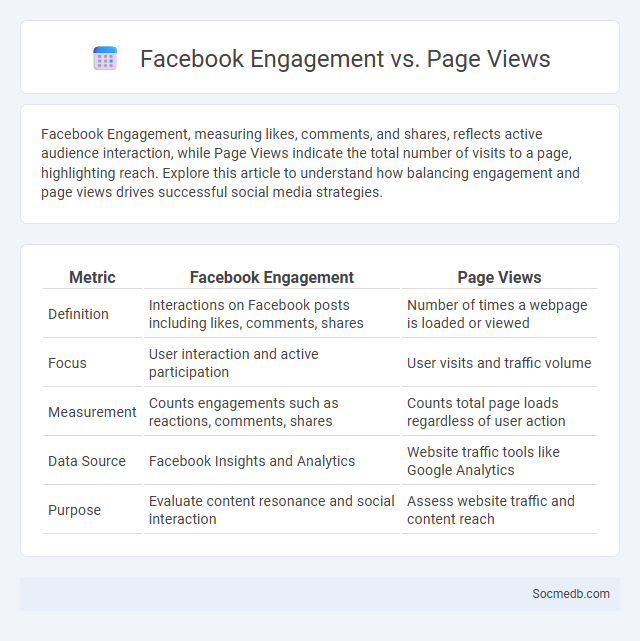
Photo illustration: Facebook Engagement vs Page Views
Facebook Engagement, measuring likes, comments, and shares, reflects active audience interaction, while Page Views indicate the total number of visits to a page, highlighting reach. Explore this article to understand how balancing engagement and page views drives successful social media strategies.
Table of Comparison
| Metric | Facebook Engagement | Page Views |
|---|---|---|
| Definition | Interactions on Facebook posts including likes, comments, shares | Number of times a webpage is loaded or viewed |
| Focus | User interaction and active participation | User visits and traffic volume |
| Measurement | Counts engagements such as reactions, comments, shares | Counts total page loads regardless of user action |
| Data Source | Facebook Insights and Analytics | Website traffic tools like Google Analytics |
| Purpose | Evaluate content resonance and social interaction | Assess website traffic and content reach |
Understanding Facebook Engagement
Facebook engagement measures interactions such as likes, comments, shares, and clicks, indicating how users respond to content. High engagement rates boost content visibility through Facebook's algorithm, increasing organic reach and brand awareness. Analyzing engagement metrics helps optimize post timing, format, and messaging to better connect with target audiences.
Defining Page Views on Facebook
Page views on Facebook represent the total number of times a Facebook Page's content has been loaded or viewed by users, indicating audience engagement and reach. This metric includes views from both logged-in users and visitors who are not signed into Facebook, providing comprehensive insight into content visibility. Tracking page views helps businesses and creators measure the effectiveness of their posts, optimize content strategy, and increase social media ROI.
Types of Engagement Metrics
Engagement metrics on social media include likes, comments, shares, and saves, which measure how users interact with your content. Metrics such as click-through rates, video views, and follower growth provide insights into audience behavior and content effectiveness. Understanding these key engagement types helps you optimize your strategy for better reach and interaction.
Key Differences: Engagement vs. Page Views
Engagement measures the active interaction users have with content, including likes, comments, shares, and clicks, reflecting the depth of audience involvement. Page views count the total number of times a webpage or post is loaded, indicating reach and visibility rather than user interaction. Brands prioritize engagement metrics to gauge content effectiveness and build community, while page views help assess traffic volume and awareness levels.
Why Engagement Matters More Than Page Views
Engagement on social media indicates active interaction through likes, comments, shares, and saves, reflecting genuine audience interest and connection with content. High engagement boosts algorithmic rankings, increasing visibility and organic reach far beyond what raw page views can achieve. Brands that prioritize engagement foster loyal communities, driving sustained growth, brand advocacy, and meaningful customer relationships.
Measuring Engagement on Facebook
Measuring engagement on Facebook involves analyzing key metrics such as likes, comments, shares, and post reach to gauge how effectively your content resonates with your audience. Facebook Insights provides detailed data on user interactions, including click-through rates and video views, helping you understand what drives engagement. By monitoring these metrics regularly, you can tailor your posts to increase Your reach and foster stronger community connections.
How Page Views Impact Content Strategy
Page views provide critical insights into which content resonates most with your audience, guiding the optimization of future posts to increase engagement and reach. Analyzing page views helps identify high-performing topics, peak activity times, and user behavior patterns, enabling precise adjustments to your content strategy. Leveraging this data allows you to prioritize content that drives traffic, enhances visibility, and maximizes the return on your social media efforts.
Interpreting Your Facebook Analytics Data
Interpreting your Facebook Analytics data reveals crucial insights into audience behavior, content performance, and engagement trends, enabling you to tailor your social media strategy effectively. Key metrics such as reach, impressions, and click-through rates highlight which posts resonate most with your followers. Leveraging this data empowers you to optimize content timing, format, and targeting for maximum impact on your brand's growth.
Strategies to Boost Engagement Over Page Views
Focusing on strategies to boost engagement rather than just page views increases meaningful interactions such as comments, shares, and likes, fostering a loyal community. Creating interactive content like polls, Q&A sessions, and personalized responses encourages Your audience to actively participate and deepen their connection with the brand. Prioritizing engagement metrics helps refine content strategies for sustained growth and enhanced social media presence.
Choosing the Right Metric for Your Goals
Selecting the right social media metric depends on your specific marketing objectives, such as engagement, reach, or conversion rates. For brand awareness campaigns, prioritize impressions and follower growth, while conversion-focused strategies should emphasize click-through rates and sales attribution. Understanding platform-specific analytics tools like Facebook Insights or Twitter Analytics enhances accurate measurement aligned with your goals.
 socmedb.com
socmedb.com